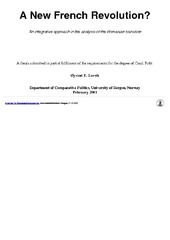| dc.contributor.author | Lervik, Øyvind E. | |
| dc.date.accessioned | 2016-09-28T11:53:44Z | |
| dc.date.available | 2016-09-28T11:53:44Z | |
| dc.date.issued | 2001 | |
| dc.identifier.uri | https://hdl.handle.net/1956/12855 | |
| dc.description | 2016: Converted from HTML to PDF | eng |
| dc.description.abstract | This thesis has focued on the Romanian transition. The critical period concerned was from March 1989, with apparent signs of liberalisation, to the 1990 elections. Romania differed from the East and Central European transitions and the background of these cases. The Integrative Approach provided the analytical framework for relations between relevant structural characteristics and the violent revolution. An examination of several levels of aggregation gave actors’ preferences and the context of the transition, forming the basis for a game theoretic analysis. The issues justifying a transition questions and its proceedings were scrutinised. Selected theories in transitology were elaborated in light of these requirements. The study thus gave a methodological critique as well. The conclusions both gave insight into the forces that provoked the Romanian transition and illustrated how it was supervised. The observations provide contributions to generalisations on rational choices under transitions’ structural constraints, if supplemented with similar theoretical approaches to other cases. The Romanian transition was incomparable to the French revolution. | en_US |
| dc.language.iso | eng | eng |
| dc.publisher | The University of Bergen | eng |
| dc.title | A New French Revolution? An integrative approach in the analysis of the Romanian transition | eng |
| dc.type | Master thesis | en_US |
| dc.rights.holder | Copyright the author. All rights reserved. | en_US |
